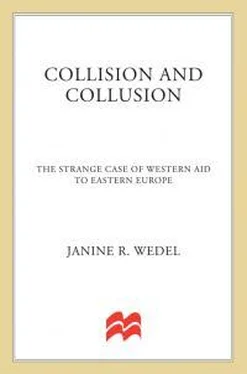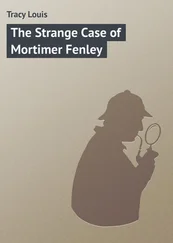Further, recipient officials generally could not participate in the process once it was under way, because the IQC contracts, as well as work orders, had been signed only between consultants and Washington USAID. According to Krawczuk and other officials, consultants’ reports generally were addressed to USAID in Washington, not to the local officials who supposedly were their beneficiaries (although copies were sometimes sent to the ministries). Krawczuk found that he had no authority to monitor or schedule consultants’ work.29
Indeed, a fundamental drawback of the IQCs was that they generally afforded recipients and USAID field offices little flexibility. The circumstances under which USAID funded the IQC consortia and the working relationships under the IQCs baffled many Central European officials. A USAID-commissioned evaluation of its privatization projects concluded that the fact that USAID field offices had little authority to authorize or to amend funding of program assistance “at times, held up host country requested assistance.”30
When the recipients had any input at all under USAID’s IQC rules, it was to choose among the three Big Six contractors that Washington had selected.31 But USAID did not always follow its own rules. For example, Slovakia’s privatization ministry was first told it could choose from among the three IQC firms. But when the ministry sent a letter to the local USAID office requesting one of the firms, the ministry was told that only another firm could be made available in a timely fashion.32 A high-level Slovak official concluded that “all this selecting [a] company seems to be only theater.”
Programs under USAID contracting mechanisms were seen by many officials in the region as less effective than EU programs because the United States allowed recipients less leverage to set terms or to select experts. Indeed (again in the case of the Polish government), the recipient was not consulted about the IQC strategy or the particular firms chosen and was not officially informed even after the decisions were made. Finance Ministry official Kawalec found out about the IQC contracts only by accident. The result, Kawalec reported, was that “a number of consultants are looking for profitable assignments that may be completely unnecessary.… The U.S. government is paying them to provide advice to us without asking us, even without informing us.”33 When the Ministry of Finance itself tried to use the IQCs, says Kawalec, it was turned down by Washington.
SHIPS IN THE NIGHT
All these factors—the donors’ misplaced emphasis on the politicized company town, their situating the Big Six firms at the helm of aid delivery in the rush to help, the ad hoc setup of much technical assistance fostered in part by some donors’ ideologically driven misconceptions of the “private” sector—did not augur well for developing effective working relationships with recipients or for long-term receptiveness on the part of the host populations. On one side were the advisers, often far away, both physically and mentally, from the environment of their hosts due to the fly-in, fly-out and uncoordinated nature of much of the aid, and their lack of preparation coupled with frequent obliviousness to that deficiency. On the other side were overextended, underpaid, and sometimes corruptible officials in environments rife with lucrative opportunities. All this portended a costly disconnection: a blatant lack of relationships between donor and recipient representatives that would render much of the aid ineffectual and sometimes even irritating to the hosts.
The scene in the halls of Central and Eastern European ministries in the early days of the east-west encounter told much of the story. Advisers from international lending institutions and a multitude of aid programs that were, for the most part, working in isolation from one another descended on the same departments in the same ministries. They were greeted by an overburdened staff—typically political appointees or poorly paid civil servants, most of whom could neither type efficiently nor speak English. By 4 P.M. each day, the secretaries had gone home, but the officials, the ones making policy and running the country, stayed much later. Life was particularly hard for the handful of officials in any given agency who had the information sought by the foreigners and the English-language skills necessary to communicate with them. The same officials became responsible for meeting the hordes of visiting delegations and consultants, and often reached a saturation point. The GAO related that “in the early stages of reform, many consultants came to Warsaw for 1-to-2-week stays, interviewed some officials, and then produced reports that merely repeated everything they had been told.”34 Indeed, the hosts sometimes appeared to be doing the educating.
Often the people and projects offered by donors were mismatched to the needs of the hosts. For example, the GAO criticized a project in which volunteers under a USAID program had spent four to six weeks in Poland working on specific tasks. One volunteer charged with helping Polish legal associations to establish a commercial law library, an American divorce lawyer with no Polish-language skills, “had difficulty getting the legal associations to work together effectively.” In time, reported the GAO, even “USAID officials acknowledged that the person in charge was ‘not the best person’ for the job.”35 Indeed, consultants often came with little knowledge of the countries in which they were to intervene or the contexts of the problems they were to address. Unlike long-term consultants, who frequently were committed to a particular country and acquired enough knowledge of the local landscape to be genuinely useful, the short-term consultants tended to be unfamiliar with, and even uninterested in, local conditions.
Further, despite the pretense of treating the peoples of the Second World as candidates for First World status, many Western consultants applied assumptions and experience they had gleaned from their work in the Third World. These assumptions not only constituted a deep insult, but also reinforced the widely held view that Western consultants generally were unfamiliar with the institutions peculiar to postcommunist economies. Some consultants came with ready solutions that did not take into account the planned economies and state socialism of Central and Eastern Europe and the diverse experiences of the countries of the region, critical aspects of the starting point for any “reform.”36 In 1990, for example, finance official Kawalec doubted the approach of Jeffrey Sachs to the Polish economy: “There were and still are many question marks [about] how the economy will respond. In this, Sachs had no knowledge at all because he was not familiar with Communist economies. He tried to treat this economy the same as Latin American ones.”37 Indeed, a frequent complaint from Central and Eastern Europeans who came into contact with foreign advisers was that they did not know the particular needs, circumstances, and situation of the recipients and sometimes failed to take into account the level of infrastructure rebuilding that was necessary.38
Another complaint was that fly-in, fly-out consultants from far away were not always sensitive to the gravity of the decisions at hand. As Professor of Economics Grzegorz Kołodko, director of the Institute of Finance (and later first deputy prime minister and minister of finance) explained: “If there’s a difference between Professor [Jeffrey] Sachs and myself, it’s that I’m not from outside. I could have a cynical, purely professional … relationship, like [with] Argentina – I travel there, live in a five-star hotel, and I say ‘lower real wages by 20 percent overnight. And you have to stand it because you don’t have any other way out [and] this results from my economic analysis.’… If it works, then I’ll take the credit. If it doesn’t work, then I can say: ‘You Argentinians, you have screwed up again.’”39
Читать дальше












